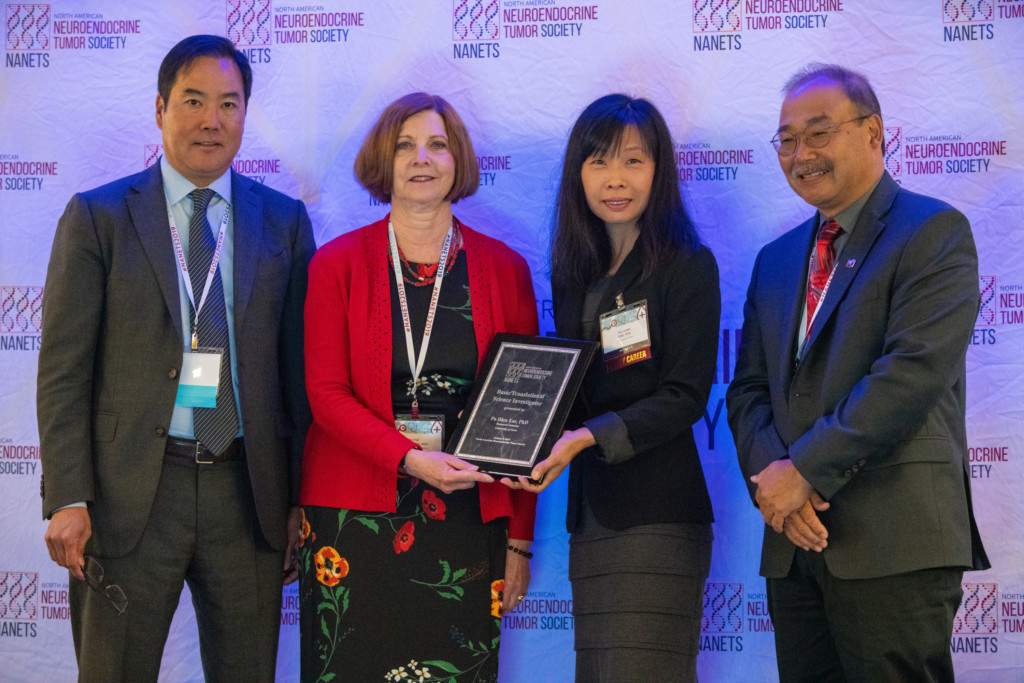
The 2019 North American Neuroendocrine Tumor Society (NANETS) Multidisciplinary NET Medical Symposium was held in Boston in early October and was hugely successful. The symposium brought investigators together from around the globe to present and discuss the latest updates in NET treatment and cutting-edge research in NET biology, including the significant work being funded by NETRF.
Notable advances in NETs highlighted
This year’s notable advances in NET research were highlighted in a talk by Dr. Robert Jensen from the National Institutes of Health, which included projects currently supported by NETRF. Dr. Jensen stressed the importance of developing better NET tumor models that included human spheroid and organoid strategies, such as those by Dr. Hans Clevers, a renowned leader in the field whose work on NET organoid models is currently funded by NETRF. These tumor models use human cells grown in the laboratory and can be used to study tumor development and to test new therapeutic agents.
Dr. Jensen also highlighted work from Dr. Ramesh Shivdasani, for his NETRF-funded analysis of the genetic basis of NETs. This basic science work addresses the molecular basis of NETs and identified two genes (ARX and PDX1) whose respective expression levels in NET cells had very high prognostic value. Going forward, assaying for the expression of these genes in patient tumors may prove to be a very effective and simple way to help determine clinical treatment options.
The importance of basic and translational research to finding NET cures was stressed by Dr. Shivdasani, as he presented his work during his own talk, and other speakers focusing on cellular functions that were relevant to cancer cells. These studies hold important clues into how to combat NETs.
Nobel Prize winner addresses NETs
Dr. Joan Brugge from Harvard Medical School gave the keynote address, pointing to the many ways that normal and tumor cells manage cellular stresses. For example, stress brought on by rapid cell proliferation that may normally lead to cell death may be evaded in cancer cells and could be therapeutically targeted. Similarly, Dr. William Kaelin, from the Dana-Farber Cancer Institute, presented work on another aspect of basic cell biology, that of oxygen regulation and cell stress involving two proteins, VHL and HIF. Dr. Kaelin’s contributions to understanding this important process of cellular metabolism and its relevance to NETs and other cancers are well recognized and respected. Two days following his NANETS presentation, Dr. Kaelin was awarded the 2019 Nobel Prize in physiology and medicine for his seminal contributions to understanding this cellular process and its potential for therapeutic development.
Growing the field for the future
Each year NANETS selects young investigators to receive awards for either the best proposed clinical research or basic/translational research. NETRF is proud to sponsor the Basic/Translational Science Investigator (BTSI) Award.
An outstanding young investigator with a promising future, Dr. Po Hien Ear, University of Iowa, received the 2019 BTSI Award for her proposal titled “Development of In Vitro Pre-Clinical Models for Small Bowel Neuroendocrine Tumor Drug Testing.” In an area Dr. Jensen previously listed as a priority, Dr. Ear will work to develop NET tumor models in order to discover novel future therapeutics to treat NETs. Her research focuses on understanding the cellular basis of NETs in order to identify new potential targets for anti-cancer drugs.
Passing knowledge to patients and caregivers
Following the three-day professional conference, NANETS and NETRF collaborated on a patient and caregiver NET educational conference. The live stream archive can be viewed on NETRF’s YouTube channel.
